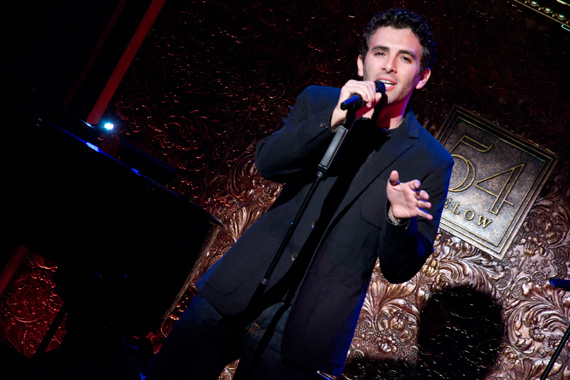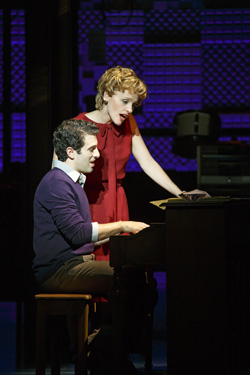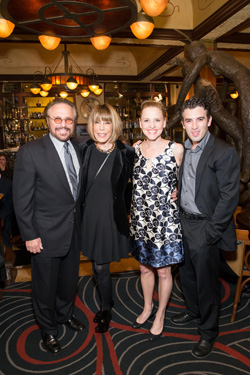Jersey Boys Star Jarrod Spector Knows How It Feels for Frankie Valli and Barry Mann to Watch as He Plays Them Onstage
The actor-singer is playing 54 Below on Sundays before the Broadway debut of ”Beautiful — The Carole King Musical”, in which he stars.

(© David Gordon)
Jarrod Spector is not a chart-topping recording artist, but he does play them onstage. He spent six years playing Four Seasons front man Frankie Valli in Broadway’s Jersey Boys. He’s currently creating the role of legendary songwriter Barry Mann (“You’ve Lost That Lovin’ Feelin'”) in Beautiful — The Carole King Musical, which is set to begin performances on Broadway November 21. Before that, however, he’s premiering a new cabaret show at 54 Below (October 27-November 17).
TheaterMania spoke to the super-busy Spector about his career, his musical tastes, and that awkward moment when you realize the character you’re playing is sitting six feet away from you and staring you in the eyes.

(© Joan Marcus)
Beautiful premiered in San Francisco in September. How did it go?
Great. It’s always a little bit scary. You’re in this insulated place: the rehearsal room. The writers think their jokes are funny. The director thinks it’s exciting. Everybody wants it to work. You think and hope that it’s good. Then you take that leap when you get in front of people and you find out whether the general public thinks it’s good. So far the reaction has been really positive.
Is Beautiful a jukebox musical?
I think they’re using the term “jukebox musical” for this. It’s actually inaccurate. To me a “jukebox musical” is Mamma Mia! where you use a bunch of music to tell a story that has nothing to do with it. This is very much a biography of Carole and [former husband] Gerry [Goffin] and Barry and [his wife] Cynthia [Weil] using the music of that day, a la Jersey Boys.
Does it depend on how much the lyrics of a pop song tell a story on its own?
We have a song in our show called “Uptown.” The lyrics are great. It very much tells a story. It’s socially relevant. Yet, I don’t know how anyone could use it as dialogue. That would create a “toe-scrunching moment,” as [Jersey Boys director] Des McAnuff used to say.
What’s a "toe-scrunching moment"?
A lot of times you see a show that uses pop songs as dialogue and it doesn’t quite fit. You’re cringing in the audience for the actors: “Oh God, I can’t believe they’re trying to do that. Do they know how stupid that is?” While the lyrics are not used as dialogue in Beautiful, they are emotionally informed by the events of the show. That’s what a bio-musical can do that a concert can’t. You get to see the songs in their creation context. Many of Carole’s lyrics are so personal and autobiographical.
You’re playing another major figure in the music industry. What’s different about playing Barry Mann as opposed to Frankie Valli?
Frankie is a tortured soul, a chronically dissatisfied man. Barry is this unabashedly neurotic, funny, romantic, sweet guy. He finds the love of his life, writes number-one hits, and has a lot of satisfaction in his life. Meeting him and Cynthia, you can see it. They’re very happy people.

(© Drew Alitzer)
How did you meet Barry Mann?
The first time I met Barry was after I had already played him in a reading. It was a small room, quite well-lit and in the middle of the day. He was six feet away from me. I was watching him watch me. We didn’t meet until after. It was nerve-racking. I know he had read the script, but it’s still odd to see yourself being played.
That sounds incredibly awkward. Did he say anything about your portrayal?
I was standing with him and a big group of his friends at the opening in San Francisco. Barry said to me [slipping into character], “The first time I read the script I told everyone: I didn’t realize I was a hypochondriac.” Several of his friends chimed in, “Oh no, this is perfectly written. All you ever talk about is ailments.” It’s hard being objective about exactly who you are. He’s a funny character and a very joyful man. You can tell how passionate he and Cynthia are about the music.
A lot of their songs are quite socially relevant, too. Is that important to you in your own musical tastes?
I respect Bono’s lyrics about the world more than some idiot twenty-year-old rapper talking about getting drunk in a club. Frankly, I couldn’t give a sh*t. I have much more respect for someone who can actually say something important and relevant. This is why I think they’re so proud of “Uptown,” because it is such a social commentary. The music is so infectious, but if you look at their lyrics, they’re so smart: “On Broadway.” Barry and Cynthia actually care, not just about music and success, but about saying something real.
Do you feel like you’ve earned a master’s degree in American pop music of the ’60s?
A little bit. I’m very happy about it. I grew up listening to a lot of Bobby Darin and Motown. Bobby is a little earlier, but it’s all the beginning of pop and rock 'n' roll. I loved seeing families come to Jersey Boys, sometimes three generations. Now I know for a fact that only the grandmother listened to Frankie Valli on the radio while the forty-year-old mother listened to Billy Joel or Michael Jackson and the kid likes Bruno Mars or Maroon 5. Good music is good music.
The song list for your 54 Below show is quite eclectic. How did you go about choosing the music?
I did a concert called “Minor Fall, Major Lift,” and I did it all over the city. 54 Below wanted me to do a show, but it had to be brand-new. I agreed. I was ready to retire the old show. I know I have to marry what people want to hear and what I want to sing. People know me from Jersey Boys, so if I do a concert with no Frankie Valli, that’s going to be a problem. I went back to the idea that his music affects all these generations and came up with an evolution of high tenors.
What does that mean?
If you can sing Frankie, you can also sing Little Richard and Freddie Mercury and George Michael and Bruno Mars and The Beach Boys. They all live, vocally, in the same place. If you play a role for a long time, people in and out of the industry assume that it’s the only thing you can do, especially if you do it for a long time. They put you in a cage. For me this show is a little bit of me shaking the bars.
Is the ability to curate the material why you like cabaret?
Yes. It’s fun and terrifying. If you’re in a show written by someone else and they cast you in it, you always have that to hide behind. “I didn’t direct it; I didn’t write it; I’m just doing the best I can.” In cabaret, it’s just you and the audience. You can see everybody’s face. You really have to lay yourself bare up there. It’s the only way to do it properly and it’s the only reason people care. It’s a very intimate thing. It’s scary, but it can be wonderfully rewarding.










